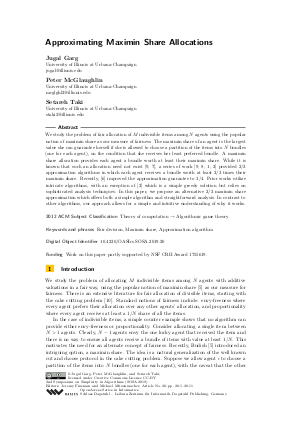Approximating Maximin Share Allocations
Authors Jugal Garg, Peter McGlaughlin, Setareh Taki
-
Part of:
Volume:
2nd Symposium on Simplicity in Algorithms (SOSA 2019)
Part of: Series: Open Access Series in Informatics (OASIcs) - License:
 Creative Commons Attribution 3.0 Unported license
Creative Commons Attribution 3.0 Unported license
- Publication Date: 2019-01-08
File

PDF
OASIcs.SOSA.2019.20.pdf
- Filesize: 388 kB
- 11 pages
Document Identifiers
Subject Classification
Keywords
- Fair division
- Maximin share
- Approximation algorithm
Metrics
- Access Statistics
-
Total Accesses (updated on a weekly basis)
0Document
0Metadata
Abstract
We study the problem of fair allocation of M indivisible items among N agents using the popular notion of maximin share as our measure of fairness. The maximin share of an agent is the largest value she can guarantee herself if she is allowed to choose a partition of the items into N bundles (one for each agent), on the condition that she receives her least preferred bundle. A maximin share allocation provides each agent a bundle worth at least their maximin share. While it is known that such an allocation need not exist [Procaccia and Wang, 2014; Kurokawa et al., 2016], a series of work [Procaccia and Wang, 2014; David Kurokawa et al., 2018; Amanatidis et al., 2017; Barman and Krishna Murthy, 2017] provided 2/3 approximation algorithms in which each agent receives a bundle worth at least 2/3 times their maximin share. Recently, [Ghodsi et al., 2018] improved the approximation guarantee to 3/4. Prior works utilize intricate algorithms, with an exception of [Barman and Krishna Murthy, 2017] which is a simple greedy solution but relies on sophisticated analysis techniques. In this paper, we propose an alternative 2/3 maximin share approximation which offers both a simple algorithm and straightforward analysis. In contrast to other algorithms, our approach allows for a simple and intuitive understanding of why it works.
Cite As Get BibTex
Jugal Garg, Peter McGlaughlin, and Setareh Taki. Approximating Maximin Share Allocations. In 2nd Symposium on Simplicity in Algorithms (SOSA 2019). Open Access Series in Informatics (OASIcs), Volume 69, pp. 20:1-20:11, Schloss Dagstuhl – Leibniz-Zentrum für Informatik (2019)
https://doi.org/10.4230/OASIcs.SOSA.2019.20
BibTex
@InProceedings{garg_et_al:OASIcs.SOSA.2019.20,
author = {Garg, Jugal and McGlaughlin, Peter and Taki, Setareh},
title = {{Approximating Maximin Share Allocations}},
booktitle = {2nd Symposium on Simplicity in Algorithms (SOSA 2019)},
pages = {20:1--20:11},
series = {Open Access Series in Informatics (OASIcs)},
ISBN = {978-3-95977-099-6},
ISSN = {2190-6807},
year = {2019},
volume = {69},
editor = {Fineman, Jeremy T. and Mitzenmacher, Michael},
publisher = {Schloss Dagstuhl -- Leibniz-Zentrum f{\"u}r Informatik},
address = {Dagstuhl, Germany},
URL = {https://drops.dagstuhl.de/entities/document/10.4230/OASIcs.SOSA.2019.20},
URN = {urn:nbn:de:0030-drops-100465},
doi = {10.4230/OASIcs.SOSA.2019.20},
annote = {Keywords: Fair division, Maximin share, Approximation algorithm}
}
Author Details
References
-
Georgios Amanatidis, Evangelos Markakis, Afshin Nikzad, and Amin Saberi. Approximation algorithms for computing maximin share allocations. ACM Transactions on Algorithms (TALG), 13(4):52, 2017.

-
Siddharth Barman and Sanath Kumar Krishna Murthy. Approximation algorithms for maximin fair division. In Proceedings of the 2017 ACM Conference on Economics and Computation, pages 647-664. ACM, 2017.

-
Sylvain Bouveret and Michel Lemaître. Characterizing conflicts in fair division of indivisible goods using a scale of criteria. Autonomous Agents and Multi-Agent Systems, 30(2):259-290, 2016.

-
Sylvain Bouveret and Michel Lemaître. Efficiency and sequenceability in fair division of indivisible goods with additive preferences. arXiv preprint arXiv:1604.01734, 2016.

-
Eric Budish. The combinatorial assignment problem: Approximate competitive equilibrium from equal incomes. Journal of Political Economy, 119(6):1061-1103, 2011.

-
Mohammad Ghodsi, MohammadTaghi HajiAghayi, Masoud Seddighin, Saeed Seddighin, and Hadi Yami. Fair allocation of indivisible goods: Improvement and generalization. In EC, 2018.

-
David Kurokawa, Ariel D Procaccia, and Junxing Wang. When can the maximin share guarantee be guaranteed? In AAAI, volume 16, pages 523-529, 2016.

-
David Kurokawa, Ariel D. Procaccia, and Junxing Wang. Fair Enough: Guaranteeing Approximate Maximin Shares. J. ACM, 65(2):8:1-8:27, 2018.

-
Ariel D Procaccia and Junxing Wang. Fair enough: Guaranteeing approximate maximin shares. In Proceedings of the fifteenth ACM conference on Economics and computation, pages 675-692. ACM, 2014.

-
Hugo Steinhaus. The problem of fair division. Econometrica, 16:101-104, 1948.

-
Gerhard J Woeginger. A polynomial-time approximation scheme for maximizing the minimum machine completion time. Operations Research Letters, 20(4):149-154, 1997.

